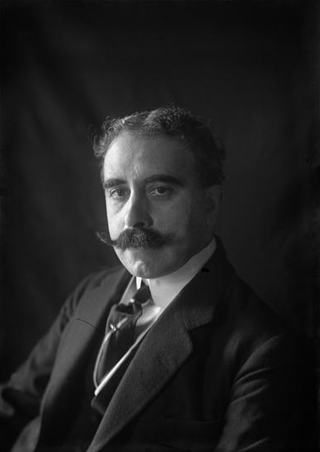Top Qs
Timeline
Chat
Perspective
Júlio Dantas
Portuguese writer, politician and doctor From Wikipedia, the free encyclopedia
Remove ads
Júlio Dantas, GCC (1876 – 25 May 1962) was a Portuguese doctor, poet, journalist, politician, diplomat and playwright.
You can help expand this article with text translated from the corresponding article in Portuguese. (November 2015) Click [show] for important translation instructions.
|
Remove ads
Biography
Summarize
Perspective
Writing career
In 1902,[citation needed] Dantas published the one-act verse play A Ceia dos Cardeais (The Dinner of the Cardinals).[1]: 85 In 1907, his one-act play Rosas de Todo o Ano (Roses all the Year) had its premiere in Lisbon. It was later translated into English by A. F. d'Almeida Carvalho and Mrs. Edward Lewis, and its 1912 Royal Court Theatre debut was the first time a play translated from Portuguese had been performed in London.[2]
In 1931, one of his plays was adapted for the screen as A Severa: it was one of the earliest sound films in Portuguese cinema.[3] In 1947, he published the play Frei António das Chagas about a Portuguese soldier's conversion to becoming a mystic.[4]
Dantas was a friend of the politician Vitorino Guimarães, having dedicated the poem "A minha boneca" ("My Doll") to his daughter Elina Guimarães during her childhood.[5]: 256
Political and diplomatic career
Following the Bloody Night in October 1921 and Francisco Cunha Leal's appointment as prime minister, Dantas began serving as Minister of Foreign Affairs on 16 December 1921.[6] With the collapse of António Maria da Silva's cabinet on 30 October 1923, António Ginestal Machado was made prime minister and Dantas was again appointed Minister of Foreign Affairs on 15 November that year.[7] He also served as Minister of Education.[8]
During this period, the First Portuguese Republic, he served as president of the Nationalist Republican Party. He later served as a delegate to the League of Nations.[9]
Other work
In 1936, Dantas was a founding member of the Portuguese Academy of History, which was created by the Estado Novo dictatorship as a way to instill a collective cultural history and memory in the country.[10]: 131–132 In 1954, he headed a government commission to celebrate the centenary of Almeida Garrett's death.[11]
Dantas served as president of the Lisbon Academy of Sciences.[12]
Personal life
Dantas died on 25 May 1962 at the age of 86.[12]
Remove ads
Legacy
According to Ronald Hilton, Dantas had established himself as the dominant figure of the Portuguese literary scene in the early twentieth century.[1]: 85 However, his influence on younger generations of writers began to wane as he was considered "old-fashioned".[1]: 85 In 1916, Dantas came under attack from Futurist artist and writer Almada Negreiros through his Manifesto Anti-Dantas, which employed a radical critique of contemporary Portuguese culture.[13]: 42 Ignacio Infante wrote that Dantas was seen to represent an "older reactionary condition" which was keeping the Portuguese people in an alleged state of "cultural degradation".[13]: 43
Remove ads
Selected works by Dantas
Dramatic works
Theatre
- A Ceia dos Cardeais (The Dinner of the Cardinals; 1902)
- Rosas de Todo o Ano (Roses all the Year; premiered in 1907)
- Frei António das Chagas (1947)
Poetry collections
Prose
References
Wikiwand - on
Seamless Wikipedia browsing. On steroids.
Remove ads


